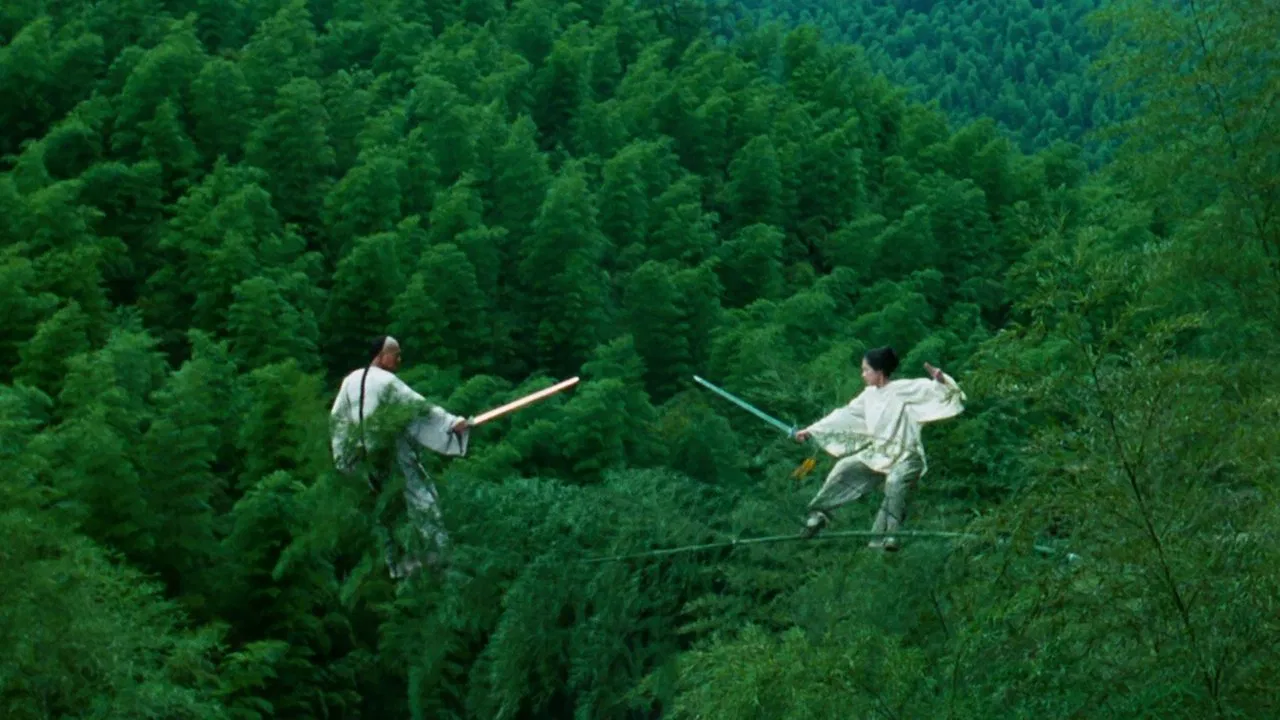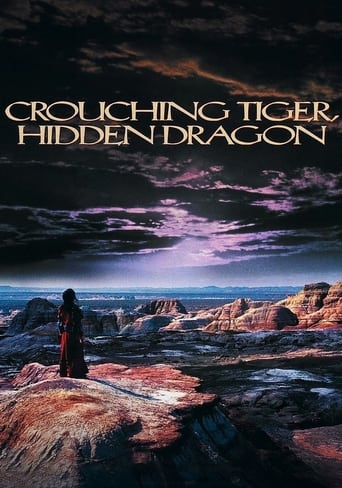merelyaninnuendo
Crouching Tiger, Hidden DragonThe action sequences can be inedible for some viewers but one cannot deny the fact about the way they are projected, as they express rage, fury and vulnerability more than the performance can; this is a masterstroke by the makers and the primary reason of its definite impression that it leaves the audience with. The script doesn't bar any specific format and has a newer and smarter structure to offer, that is completely adaptive and enthralling in its own way of storytelling. Ang Lee; the director, has done a tremendous work on executing such an eerie and humane vision of its "meta-human" characters. It is rich on technical aspects like editing, sound department and choreography. The performance unfortunately is not something where the feature scores and the actors, too weren't given enough range and room to flaunt in or factor in except for the lead actress. Despite of brilliant execution, it fails to draw out the essential emotions from the screen which at a certain point, is what it completely relies upon and in the end leaves this hollow space floating in the air. Crouching Tiger, Hidden Dragon is actually hidden beneath its self-created legacy that is layered and installed subtly which is plausible but it also never goes loud even when it becomes essential.
b-18258
Lee's famous film, Crouching Tiger, Hidden Dragon, is being marketed as both a loving homage and a redemption of the alleged excesses of the HK martial arts movie, a questionable approach since excess — in the larger- than-life characters, stylized violence, and dazzling shifts of tone — is a primary lure of these films. In Lee's words, "People tend to look down on the genre. Some may have thought it strange that I could just drop what I normally do and make something like a B-movie. And as I was doing it, there was no escape. I had to bring in drama, I had to bring in women, I had to bring in beauty and whatever I feel added quality to it. It became an Ang Lee movie."The film has a muted, elegant look that works in its favor to transport the viewer to its setting of ancient China, meticulously recreated.
ElMaruecan82
If Akira Kurosawa could live for a hundred years, he would have made movies like "Crouching Tiger and Hidden Dragon", an epic tale of love and duty told with stylish grace and poetry, and… a good deal of action sequences, now, that's the most honest and serious compliment I can give to Ang Lee.His film has been regarded as the culmination of 'martial arts' movies but I'm not too hot about this label, because my mind can't help but associate it with Bruce Lee, Van Damme or Jackie Chan's flicks. I'm aware that 'martial arts' is the most popular genre in China or East-Asia in general and is widely associated to plots involving apprenticeship, relationships between masters and disciples, tales of revenges, of good vs. evil and quest for a sacred relics or an inner peace, well, while "Tiger" does handle these elements, it is beyond genre tagging, it is a film that tackles usual archetypes but with indomitable freedom and a style that can appeal to any movie lover. Still, ever since this film was made, there would be two Lees counting in the legendary scroll of Asian cinema.The film is about two skilled fighters: a master swordsman Li Mu Bai (Chow Yun-fat) and female bodyguard Yu Shu Lien (Michelle Yeoh) who have in common a precious loss, his former friend he promised to avenge and, her fiancée she promised to love and the same dedication to their duty, that feels like a decoy where they can hide the uncertain feelings toward each other, but that wouldn't fool an unwise eye. Li Mu Bai is instantly recognizable as a heroic figure but when we see him, he's a worn-out man, contemplating his burdens with a tired spirit. To seal this abandon, he decides to give up his sacred sword: "Green Destiny" and assigns Shu Lien to give it as a present to a friend in Beijing. There she meets Jen Yu, a governor's daughter played by Zhang Ziyi and whose governess (Cheng Pei-Pei) is revealed to be bandit Jade Fox (no spoiler as this comes quite early).The relationships between masters and disciples are vital to the film and they're all ambiguous and enriched with other personal subplots that unfolds like a rose under the sun, Jen Yu is a fiancée but has a lover in an impetuous desert bandit named Lo (Chang Chen) who also have projects for both of them, and Jen Yu remains the real mystery and core of the film, she's the leading role actually. And Ang Lee goes beyond the simplification of having just a hero, a villain and a quest. Anyone is actually a crouching tiger or a hidden dragon for that matter. It takes several viewings to really appreciate this film as you discover each time another layer of the characters' personalities, and it's never done without feeling like a character study, you can discover more about them during a fight, or a stare.Indeed, Asian cinema has this unique capability to be surprisingly quiet in a very heart-pounding way, and the counterpart is that the action sequences, meant to thrill you are hypnotic and you just stare at them as they didn't even belong to the film. "Tiger" is remembered for the gravity-defying combats where two characters can walk over a wall, jump miles ahead or literally fly over trees and there's never a moment where it feels over the top (no pun intended) or laughable, and that's a credit to the way Lee, surrounded by master visual effects and storytellers, know the audience and is aware that there's nothing as beautiful and dreamy as being able to fly, this is part of human subconscious, this is the ultimate challenge. These scenes have become immediate staples of the art martial genre and parodied everywhere, but even with that in mind, the choreographic battles are impressive.Ebert compared these actions to musical numbers in musicals, they're expected now and then as a relief or a plot punctuation, but I felt they had the same aesthetic value than in Stanley Kubrick's "Barry Lyndon", where, you forgot you were watching a film and you just admired the beauty of some shots, looking like Rembrandt and Vermer paintings. The beauty of "Tiger" and the cinematography are simply breathtaking, and it is so contagious that even the characters become part of it. There's a panoramic shot over a long wedding outfit, and it takes as long as it would to show a bamboo tree or a pagoda, but this is the dazzling and beautiful Jen. And then an arrow hits the rickshaw, she raises her curtain and the action starts. There's just something in Lee's directing that shows fighting with art and displays art with the soul of the fighter. Martial Arts came from the Art of War and that's exactly what you get in the film: battles and art.And like for the art, the greatest battles aren't necessarily in forest, arenas or castles under the moonlight but in the mind of tortured characters who are their worst adversaries. It might sound corny but not when Ang Lee is in the command and treats his material with a respect to the audience, one that provided one of the best-looking movies of the 2000's, and as today, the highest-grossing foreign movie of all time.The title comes from Chinese proverb "Behind the rock in the dark probably hides a tiger, and the coiling giant root resembles a crouching dragon." Well, I wonder what extraordinary effect this had on audiences sitting in the dark and experience the story told by a director who, on the field of cinematic mastery, is not just a tiger and a dragon, but a butterfly who swings across the breeze with poetic lightness and gracious beauty, defying the wind like Lee did with cinematic conventions.

